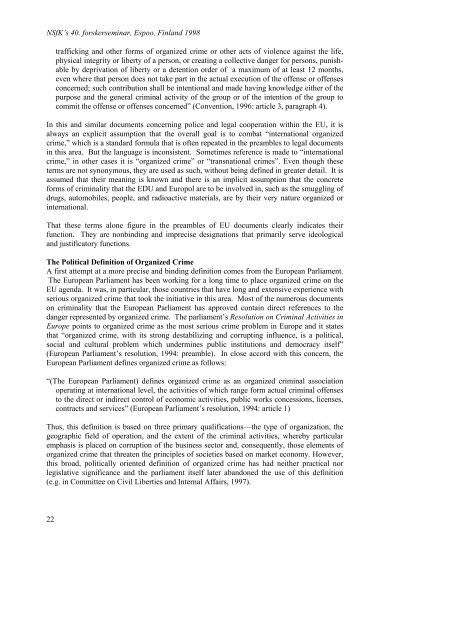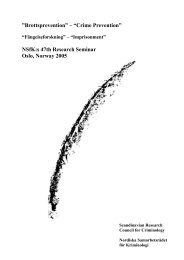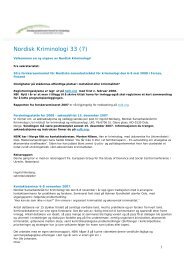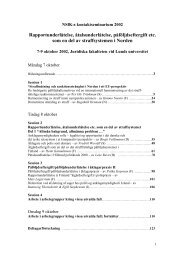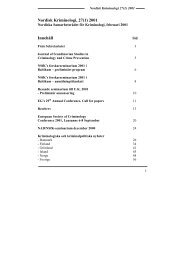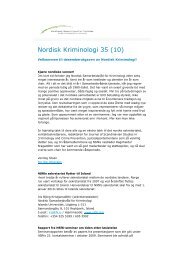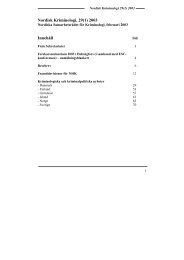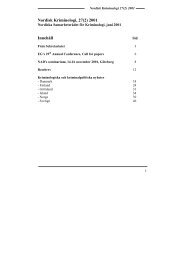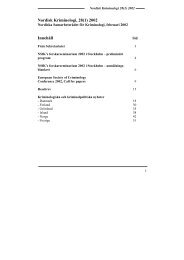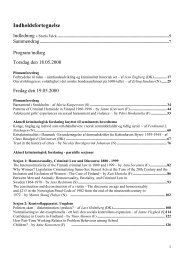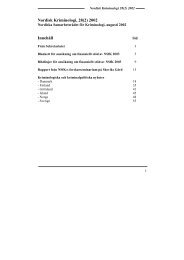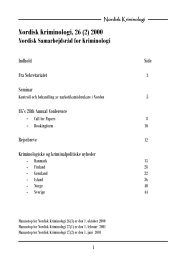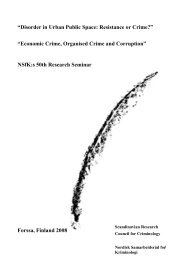Organised Crime & Crime Prevention - what works? - Scandinavian ...
Organised Crime & Crime Prevention - what works? - Scandinavian ...
Organised Crime & Crime Prevention - what works? - Scandinavian ...
Create successful ePaper yourself
Turn your PDF publications into a flip-book with our unique Google optimized e-Paper software.
NSfK’s 40. forskerseminar, Espoo, Finland 1998<br />
22<br />
trafficking and other forms of organized crime or other acts of violence against the life,<br />
physical integrity or liberty of a person, or creating a collective danger for persons, punishable<br />
by deprivation of liberty or a detention order of a maximum of at least 12 months,<br />
even where that person does not take part in the actual execution of the offense or offenses<br />
concerned; such contribution shall be intentional and made having knowledge either of the<br />
purpose and the general criminal activity of the group or of the intention of the group to<br />
commit the offense or offenses concerned” (Convention, 1996: article 3, paragraph 4).<br />
In this and similar documents concerning police and legal cooperation within the EU, it is<br />
always an explicit assumption that the overall goal is to combat “international organized<br />
crime,” which is a standard formula that is often repeated in the preambles to legal documents<br />
in this area. But the language is inconsistent. Sometimes reference is made to “international<br />
crime,” in other cases it is “organized crime” or “transnational crimes”. Even though these<br />
terms are not synonymous, they are used as such, without being defined in greater detail. It is<br />
assumed that their meaning is known and there is an implicit assumption that the concrete<br />
forms of criminality that the EDU and Europol are to be involved in, such as the smuggling of<br />
drugs, automobiles, people, and radioactive materials, are by their very nature organized or<br />
international.<br />
That these terms alone figure in the preambles of EU documents clearly indicates their<br />
function. They are nonbinding and imprecise designations that primarily serve ideological<br />
and justificatory functions.<br />
The Political Definition of Organized <strong>Crime</strong><br />
A first attempt at a more precise and binding definition comes from the European Parliament.<br />
The European Parliament has been working for a long time to place organized crime on the<br />
EU agenda. It was, in particular, those countries that have long and extensive experience with<br />
serious organized crime that took the initiative in this area. Most of the numerous documents<br />
on criminality that the European Parliament has approved contain direct references to the<br />
danger represented by organized crime. The parliament’s Resolution on Criminal Activities in<br />
Europe points to organized crime as the most serious crime problem in Europe and it states<br />
that “organized crime, with its strong destabilizing and corrupting influence, is a political,<br />
social and cultural problem which undermines public institutions and democracy itself”<br />
(European Parliament’s resolution, 1994: preamble). In close accord with this concern, the<br />
European Parliament defines organized crime as follows:<br />
“(The European Parliament) defines organized crime as an organized criminal association<br />
operating at international level, the activities of which range form actual criminal offenses<br />
to the direct or indirect control of economic activities, public <strong>works</strong> concessions, licenses,<br />
contracts and services” (European Parliament’s resolution, 1994: article 1)<br />
Thus, this definition is based on three primary qualifications—the type of organization, the<br />
geographic field of operation, and the extent of the criminal activities, whereby particular<br />
emphasis is placed on corruption of the business sector and, consequently, those elements of<br />
organized crime that threaten the principles of societies based on market economy. However,<br />
this broad, politically oriented definition of organized crime has had neither practical nor<br />
legislative significance and the parliament itself later abandoned the use of this definition<br />
(e.g. in Committee on Civil Liberties and Internal Affairs, 1997).


